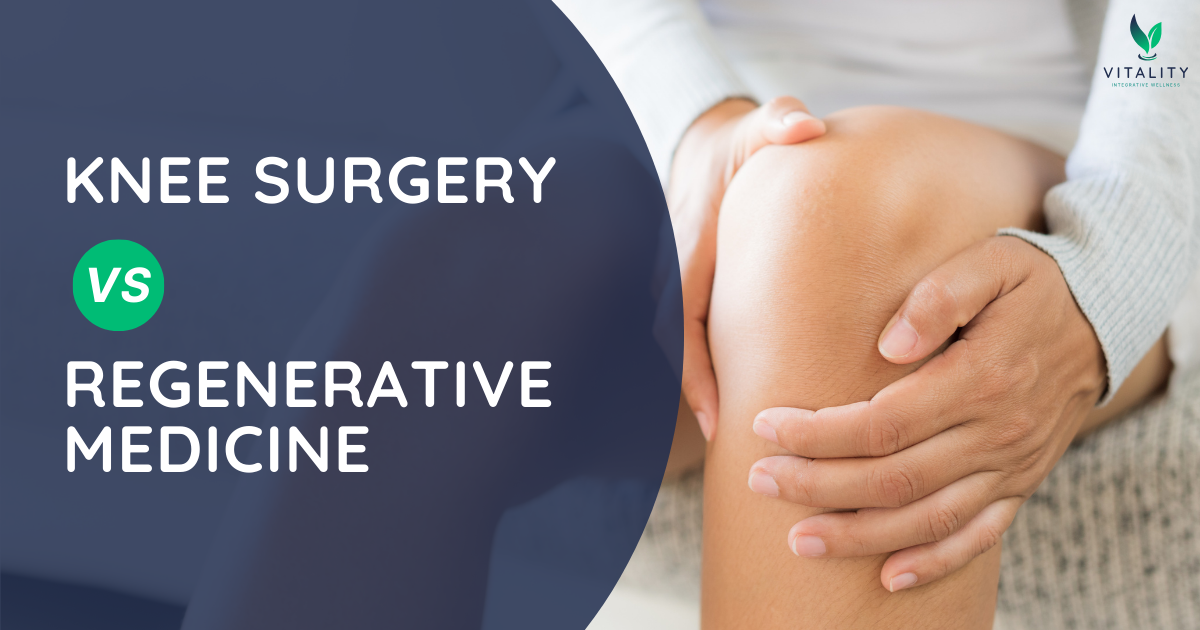
If you’ve dealt with chronic pain for a while, it can start to feel like the medical world isn't really on your side. That's why we're so excited about regenerative medicine. Imagine using your body's healing powers to get to the root of the problem and fix what's broken instead of going under the knife. Sounds pretty cool, right? We think so, too. Many of our patients find that regenerative medicine is just what they need to get back on their feet.
The True Cost of Knee Surgery
Did you know about 20% of total knee replacement (TKR) surgeries fail? And on average, nearly 25% of people who get knee surgery end up wishing they hadn't? The recovery process can take longer than expected, there can be complications, or the results just don't live up to the promises made.
If you're considering a total knee replacement (TKR) or knee surgery in general, you need to be ready for some big changes in your life and be open-minded about what "normal" might look like after surgery. There's always a risk of physical complications, and some people even struggle with mental health issues like anxiety after major surgery.
A New Hope: Regenerative Medicine for Knee Pain
Not so long ago, if you had chronic knee pain, surgery was pretty much your only option. But surgery is a big deal. It comes with risks and a long recovery time. But now, there's another way. Regenerative medicine offers a less invasive solution that uses your body's own healing processes to repair damaged tissue and reduce inflammation.
Here at Vitality Integrative Wellness, we offer several types of regenerative medicine to help people with chronic knee pain find lasting relief:
- Platelet-rich plasma (PRP) therapy: This involves injecting your own blood platelets into your knee joint to stimulate healing.
- Prolozone: This treatment uses a solution of vitamins, nutrients, and ozone gas that is injected into the knee to stimulate new tissue growth and reduce pain.
- Tissue Allograft: This involves injecting a powerful anti-inflammatory tissue matrix into the knee joint to promote healing, reduce inflammation, and improve joint function.
By harnessing your body's natural healing powers, regenerative medicine can help improve joint function, reduce inflammation, and alleviate pain.
The Bottom Line: Knee Surgery vs Regenerative Medicine
Knee surgery and regenerative medicine are two very different approaches. Keep in mind that if you wait too long it may be necessary to have knee surgery, but if you address knee pain early enough regenerative medicine is a viable treatment option.
Traditional knee surgery:
- Procedure Cost: On average, knee surgery can range from $10,000 to $50,000 or more, depending on the complexity of the procedure and factors such as insurance coverage, hospital fees, and anesthesia costs.
- Recovery Expenses: Everyone expects the operation costs but fails to consider the expenses that can pile up after the procedure. Patients should also factor in additional costs for post-operative care, physical therapy sessions, medications, and potential time off work during recovery. The dollars can add up quickly.
- Recovery time: Recovery can be painful and can last several months. You will be walking on your new knee right away, but most surgeons recommend two to three months before returning to your regular activity schedule. It will take about four to six weeks before patients can begin light resistance exercise. Once the recovery period is over, you may still have a limited range of motion, and you may not feel like you've made a complete comeback.
Regenerative medicine for the knee:
- Procedure Cost: There are several options available for regenerative medicine therapies. Costs may vary from $2,500 to $6,500 depending on the nature and severity of your condition and individual needs. Your medical provider will discuss the best options and how many sessions you may need to achieve optimal results.
- Recovery Expenses: Regenerative medicine treatments for knee pain are typically performed on an outpatient basis, it is rare that we recommend a patient take time off of work. Little to no downtime means less work is missed and less time is spent recouping losses.
- Recovery time: Regenerative medicine procedures are often minimally invasive, leading to reduced recovery expenses and a quicker return to daily activities. Patients who arrive walking will leave our office walking and can drive home, although a driver is recommended if one is available. For the first 24 to 48 hours, we recommend patients rest. We recommend only light exercise and daily activities in the following one to two weeks. Many experience significant improvements in only a few weeks.
And remember, knee surgery isn't a permanent fix. Most artificial knees last 15 to 20 years. This is why many surgeons recommend putting off knee replacement surgery until after retirement. If you get a new knee when you're young, you'll probably need another one later in life.
The Long Game: Regenerative Medicine
Regenerative medicine is more than just a quick fix. It's a long-term solution that promotes self-healing. If you have chronic knee pain caused by arthritis, damaged ligaments or tendons, torn cartilage, or other conditions, regenerative medicine can help you avoid surgery. It's less invasive, there is little to no recovery time, and you can get back to your life sooner. Plus, you get to keep all your parts by not having to go under the knife. With regenerative medicine, your knee can heal itself, and the results can last a long time. When it comes to the health of your knee, less is definitely more.
Real People, Real Results: Regenerative Medicine for Knee Pain
Let's hear from one of our patients, Dan. Dan was desperate to avoid the complications of major surgery. His knee pain was so bad that he couldn't sleep at night. But after starting treatment with us, he started to see a significant improvement after about a month. Now, he's still getting better every day. In his own words, "I walk at least a mile every night. I'm a spry 74-year-old."
What is interesting about Dan’s story is that his twin brother chose knee surgery and is still struggling with pain.
So there you have it. If you're struggling with knee pain, regenerative medicine could be the solution you've been looking for. It's less invasive, it's more natural, and it could be a lot easier on your wallet. But most importantly, it works. Just ask Dan.
Ready to find out if regenerative medicine is right for you? Request a consultation and let the Vitality team help you get to the root of your chronic pain.
Learn more about managing knee pain and exploring treatment options:
- The Road to Vitality - Creative Solutions to Pay for Alternative Therapies - According to an NIH study, nearly 40% of American adults use alternative methods to maintain their health. Embarking on a journey towards holistic wellness can change your life and offer solutions for chronic pain as well as optimal wellness.
- Understanding the Risks of Knee Replacement Surgery - A comprehensive study on the failure rates of total knee replacement surgeries.
- Patient Satisfaction Post-Knee Surgery - Research on patient outcomes and satisfaction following knee surgery.
- Cost Analysis of Knee Surgery - An overview of the financial implications of undergoing knee surgery.


